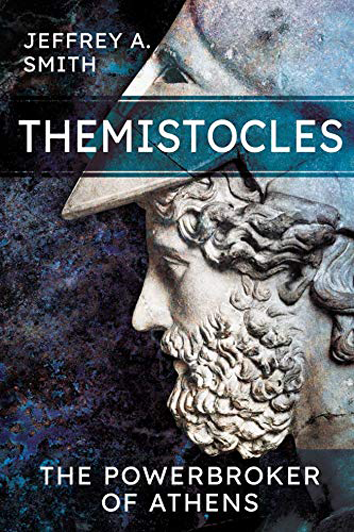
At the opening, the author's stated aim is ‘to understand the mythos of Themistocles’ (pp.x). Whether this book is successful in achieving the stated aim of its author, is open to debate. Clearly an admirer of his subject, Smith offers the reader a Themistocles who is blessed with a political acumen far above his contemporaries; however, this does, at times, in my opinion, afford Themistocles too much credit. Smith ends the introduction of his work by noting that Themistocles was a man who transcended a typical political career to end Greek mythology as a hero in the vein of Odysseus, Achilles or Theseus, yet the historical Themistocles is a man who made mistakes and died ignominiously, despite his once glittering political career.
Divided into four distinct sections, this work charts Themistocles’ career: beginning prior to Marathon in 490 BC; Themistocles’ elimination of his rivals and his rise to become the supreme political power in Athens; his impact on Greek victory against the Persians; and finally, his exile from Athens, association with the Persians, and eventual suicide, rather than lead Persian forces against his fellow Greeks. Smith's basis for the brilliance exhibited by Themistocles is the ancient Greek concept of arete, or excellence. He refers to legendary figures such as Theseus, Achilles, and Agamemnon, who demonstrated their arete in the epics, which Themistocles would have read during his education. This constant drive for excellence leads Themistocles to achieve great things, yet Smith notes that he is no hero by modern standards (xvii). In only the second chapter, it is clear that Themistocles is a risk taker, albeit of the calculated kind. He deploys the law of ostracism – the exile of a citizen from their home state if a predetermined number of votes are received for that outcome - to deal with his political adversaries within Athens. Setting out Themistocles’ rivalry with his great ideological adversary, Alcibiades, Smith demonstrates to the reader both the ruthlessness and political acumen of his subject. This chapter also highlights to the reader the political tensions within Athens in between the years of Marathon (490 BC) and Salamis (479 BC), where those like Aristides and Xanthippus, (who Smith notes were the champions of conservative Greek values) were outmanoeuvred and outthought by this most wily of political operators.
The ostracism of his political opponents is not the only occasion where Themistocles’ political skills are noted. Throughout the work, Themistocles is seen as a politician of some guile, yet that is not to say that he always achieved his aim in every situation. For example, Smith suggests that during the Congress at Corinth in 480 BC, where 70 Greek city-states gathered to decide how to oppose the Persian invasion of Xerxes, Themistocles increased his public profile, but was not granted overall command of the Greek naval forces.
Despite the challenges which he faced, and as noted in the account of Herodotus, Themistocles is almost universally credited with a foresight and tactical acumen, which saved Greece from destruction at the hands of the Persian empire. This supports Smith's assessment of his subject and is backed by two major events. The first was the fate of the vast quantities of silver which Athens had discovered at their mines in Laurium in 484 BC. Aristides suggested that all the citizens of Athens should receive their share; Themistocles argued that after the events of Marathon, Athens needed a powerful navy with which to defend itself if the Persians were to return to Greece. In this debate, Themistocles was the ultimate victor. The Laurium silver financed the building of the largest navy of any Greek city state, making Athens the pre-eminent naval power in Greece. The second of Themistocles’ great actions was the tactics at the naval battle of Salamis. Although not in overall command of the fleet (see above), Themistocles was wise enough to see that the superior seamanship of the Greeks could be most effective in tight spaces, by drawing the Persian navy in close to the shore, and shallower waters; this superiority bore itself out.
This section of the work is clear in its praise for Themistocles, which makes the latter half of the work more poignant. For Themistocles life and career balances on the twin concepts of hubris and nemesis. As Smith notes in chapter 11, ‘like the heroes of the Homeric poems, Themistocles had a fatal flaw in his hubris […] And like those heroes, he would pay the price for his actions’. After the Greek victory in the Persian war, Themistocles had, at his own expense, commissioned a temple of the Goddess Artemis next to his own home. An inscription before temple read ‘to the best counsellor’. This declared that he alone was the saviour of Greece. Despite the veracity of the statement, Themistocles was ostracised from Athens. Not content with his exile, his political enemies denounced him as complicit in Persian activities to destabilise Greece. In response, Themistocles fled to Persia and entered the service of Artaxerxes I. It is recounted that Themistocles lived well for several years as an honoured companion and advisor to the Great King. Once tasked with fighting his fellow Greeks however, this is where Themistocles cements his honour among the Greeks, committing suicide rather than fighting his city state. Like the Homeric heroes of his youth, Themistocles believed he had found his own brand of honour at the end of his life.
Overall, this is a well-balanced work. Whether the mythos of Themistocles can be understood at such a distance is an interesting discussion and one which Smith conducts both well and informatively. I believe this would serve as a fine text for the Ancient History modules on Democracy in Athens and should be read by both staff and students alike.


